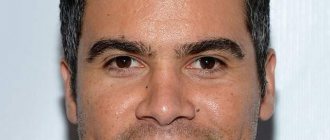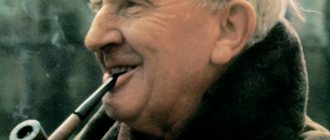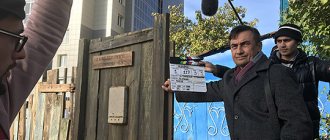Childhood and adolescence
The future TV presenter was born in Miami, but spent his entire adult childhood and youth in the UK, where the family moved shortly after his birth. His father worked as an aeronautics engineer, his mother took care of the house and raised John and his sister Harriet.
John Warren and his father
Due to Warren Sr.'s frequent business trips, scandals often arose in the family, from which the boy's passion for music and books helped him to abstract himself. He spent all his pocket money on records, played the horn and piano, and sang in a children's choir.
When John turned 7, his parents sent him to Winchester Boarding College for Boys, where he became interested in studying foreign languages. In a couple of years, he mastered French and Spanish and began studying Russian. Such an unusual choice was initially caused by the desire to stand out from the crowd and surprise others with its originality. But over time, Russian traditions and culture seriously interested the teenager, and he began to enthusiastically follow the events taking place in this mysterious country.
John Warren as a child (right)
Having received his matriculation certificate, John entered the University of Bristol, where he continued to study Russian language and literature. He even defended his dissertation on the works of Mikhail Bulgakov, whose work he had been interested in since his early youth.
What is it known for?
The Italian managed to take part in many Russian projects.
On the morning show “Maltseva” he taught viewers how to properly prepare traditional Italian pasta Bolognese.
He took part in the shows “Let's Get Married” and “Fashionable Sentence”.
Federico became the co-host of the show “Let's Go, Let's Eat!” He replaces his colleague, Briton John Warren, in the frame. They are removed one by one.
Show "Let's go, let's eat!" is a program about travel and national cuisines of the peoples with whom the presenters get acquainted. Initially, the TV project studied the cuisines of the peoples of Russia, but now the geography has expanded significantly, the presenters travel to different countries of the world.
Federico and John try any, even the most exotic dishes, the unusual ingredients of which may shock Russian TV viewers.
Life in Russia
Having successfully graduated from the university, Warren decided to go to Russia. The catalyst was the events of 1991 - the resignation of Mikhail Gorbachev, the collapse of the USSR and tanks on the streets of Moscow so struck the young man that, without hesitation, he packed his suitcase and, despite the tears and protests of his mother, went to a turbulent, but so attractive country for him.
John Warren in his youth
Having settled in Moscow, Warren got a job at a large company importing grain from Western European countries. He very quickly understood the market situation and within three years was able to open his own company in Rostov-on-Don for the export of sunflower seeds. The business flourished until the financial crisis of 1998 struck, which radically changed the life of our hero.
Having lost all the money he had earned over seven years overnight, Warren returned to the UK to try to get back on his feet. But Russia still did not let go of John, who had already managed to fall in love with this country and was frankly bored in prim, well-fed England with its measured pace of life and centuries-old rooted foundations.
In 2004, Warren returned to Moscow again and began producing traditional English sausages, which he initially prepared with his own hands in a rented apartment. It should be noted that cooking has always been our hero’s favorite hobby, so the new business soon began to bring him good money.
In Russia, John Warren began producing English sausages
John moved to Korolev, near Moscow, and opened a sausage shop there, which supplied the best restaurants and hotels in Moscow with products. Reporters began to come to Warren, interested in the enterprising foreigner who had managed to organize such an unusual business in Russia. John willingly gave interviews and appeared on television, because he understood that such advertising would only benefit his new business.
John Warren: “I hope you can see in my eyes that I love Russia very much!”
At the end of March, the film crew of the program “Let's go, let's eat!” visited Stavropol. from March 30, 2013 ““Let's go, let's eat!” in Stavropol"). We couldn't miss the chance to meet those who make the popular program. While the group was preparing the site for filming in one of the Stavropol restaurants, we were able to interview the presenter of the program, John Warren (it was helped to organize it by the chairman of the Stavropol Territory Committee on Mass Communications Igor Voronin and the head of the publishing and Internet sector Elena Nazarenko, for which they personal thanks from the editors of VS).
I admit that for a journalist John is a real gift: emotionally liberated, positive-minded, an open interlocutor, excellent command of the Russian language and an extraordinary sense of humor.
– John, weren’t you afraid to go to Russia? After all, it’s a foreign country with a different standard of living, with its own mentality, and even in the “dashing 90s”...
— Considering that I was 22 when I moved to Russia, I was not afraid of anything. There may have been some ideas, but they have changed a lot during this time. From the age of 12, I basically knew what the country was like, I knew where I was going, what the problems and advantages were. I can’t say I was surprised, I was shocked when I arrived.
You have a great culture. And for me it is important to understand it, your traditions, your superstitions. I have a diploma in Russian, and I did a dissertation on Bulgakov on the topic: “How does Yeshua Ha-Nozri differ from Jesus in the Jerusalem chapters of the novel “The Master and Margarita”.” I love Bulgakov very much. I needed to come to Russia and live here to understand what he wrote. I have a lot of respect for Russian literature. I read more Russian literature than English.
– How did you get on television? Did you already have experience participating in television projects before the “Let's Go, Let's Eat!” program?
— My life in Russia was quite strange: I traded grain, exported sunflowers, worked in a bank, opened my own sausage shop. He lived in Rostov-on-Don for seven years. And when I returned to Moscow after the crisis, I was invited to the “Dinner Party” project. True, I didn’t win, but I became noticeable, and from that moment they began to invite me to various shows - “Sasha Gardon”, “Closed Show”, “Gordonquixote”, “Honest Monday”, “NTV People”, “Let Them Talk”. I began to occupy a niche as a foreigner who speaks Russian, who will “pepper” the program about anything.
I’m not a journalist, not a TV personality, I didn’t intend to build a career in television. It just happened that way. But if you are a philologist, you have courage in your soul, you can do anything.
— John, how has your life changed due to your participation in the program “Let's Go, Let's Eat!”?
— The project started last year. The first broadcast was on November 3. We survived the difficult Russian winter. For the first time in 22 years, I stayed in Russia for the entire winter. Usually I managed to leave and warm my bones on some beach in Thailand. I love Asia very much, so I went there most often. This time, since we broadcast once a week and we do “only” one program a week, you can understand that we have no opportunity to rest. I can't even be sick now.
– Is cooking a job, a hobby or a creative activity for you?
— I love cooking because it seems to me that this is a creative process. I like that it all starts with the market. Maybe early in the morning (because by lunchtime the traders already go home) go to the market where they know you, where you won’t be deceived, where they will say: oh, John, they left something like this especially for you today. You understand how people live in the market. You can come there without having any idea what you will cook, even I would say that this is what you should do: come to the market and with an open mind understand what is there and what you want to cook.
My love for food comes from my dad, he is a serious gourmet, and everything I learned about food as a child was from him and from our holidays: we went to France very often. I'm the kind of person: if I like it, I want to do it myself. What if it works?!
I don't do anything I don't like. My film crew knows if I don't like something, you can see it in my face. It seems to me that many people, not only here on our planet, do what they don’t like: they get up when they don’t like it, they go to some job that they don’t like, they get a salary that they don’t like. like it, they go home and live with people they don't like. You have to do what you love. Maybe this is my first rule in life - do what you love, then you can be considered a happy person.
– John, since we’re talking about this, tell us about your gastronomic preferences and what you like to cook.
— I really like soups. I lived in Rostov, so I learned 250 ways to cook fish soup. Now in my arsenal I have mushroom soup, which I prepared with Santa Claus in Veliky Ustyug. This is what I call northern food. You are southerners, you grow tomatoes and cucumbers. They do not grow in Veliky Ustyug and London. We are united by some kind of love for nutritious food: it should be with starch, some kind of barley, oatmeal. Need "fuel". Therefore, I often cook soup with barley, porcini mushrooms, and champignons. Our northern cuisines are generally very similar.
Porridge is not as popular in England as it is here. We eat oatmeal, it's very healthy. Rarely - rice, semolina is not “in fashion” at all. Buckwheat doesn't exist at all. And it’s a shame, because I began to really love buckwheat with mushrooms and onions.
— How do you feel about naturopathy in nutrition?
– It seems to me that you cannot love good food if you are a purebred naturopath, because the most delicious food is sometimes very harmful. I have been struggling with weight for many years now. I used to play sports, and I didn’t care, I ate and didn’t gain weight. Over time, I began to eat healthier foods. But some dishes are not healthy. My favorite dish is duck confit. It is very harmful, but very tasty.
And what I could eat every day is plain white rice and canned tuna with mayonnaise. I will never get tired of this dish. Everything in it, except mayonnaise, is healthy.
— In Russia there is a saying: “It’s good where we are not.” A person who lives in his city for a long time often ceases to notice its positive sides. What advantages, in your opinion, does Stavropol have?
-You have a wonderful climate. I feel at home here. Today is a typical semi-cloudy, slightly gloomy day, like in London. 300 kilometers to the Caspian Sea, 300 kilometers to the Sea of Azov - an excellent place. There are stunning mountains nearby. There is a very rich gene pool here, so the people are very beautiful. You can grow almost anything. In England we grow almost nothing, we import products from thousands of kilometers away: beans from Kenya, strawberries from Peru... You absolutely don’t need this.
– John, it seems to me that in two decades you have ceased to be just a “foreigner who speaks Russian”...
“I hope it’s clear in my eyes that I love Russia very much.” Very often people think that if I criticize, it’s like I’m comparing: everything is good there, but here it’s somehow not so good. I don't compare, I believe that over 22 years I have earned myself the right to criticize the place where I live, because I want to make it more beautiful, bigger or better. If I'm sick, then I'm sick, just like you. There are problems everywhere, but they must be solved together.
I understand that “you can’t understand Russians with your mind, you can only believe.” I’m trying very hard, and it seems to me that this program is a tremendous opportunity for me to understand Russia even more deeply. Maybe someday I will say: now I understand you.
* * *
The program “Let's go, let's eat!”, prepared in Stavropol, will be aired on Sunday, April 14, at 11.25, on the NTV channel.
You can find the video version of John Warren’s interview with “Evening Stavropol” on our website www.vechorka.ru.
From the biography of John Warren
Englishman. Born in Miami (USA), but does not like to be mistakenly considered an American. At a young age he moved with his parents to the UK. From the age of 12 I studied Russian. In 1991 he graduated from the University of Bristol. In the same year he came to Russia. In Moscow, he worked in a company specializing in grain trading. Three years later he moved to Rostov-on-Don, opened a business lending to farmers and purchasing products from them for export. In 1998 the company went bankrupt and John returned to London. In May 2004, John Warren decided to organize his own production in Russia and opened a workshop in Korolev near Moscow for the production of traditional English sausages - sausage. In October 2012, he became the host of the educational project “Let’s go, let’s eat!” NTV company. Photo and video by Alexander GOLOLOBOV.
TV career
At the end of 2007, Warren took part in the entertainment program “Dinner Party”. After that, he became a frequent guest on various talk shows.
John Warren (in
A few years later, the Englishman was offered to become the host of a new culinary project, in which he would travel around Russia and talk about the customs and traditional cuisine of different regions of the country. Despite the fact that John had completely different plans at that time (he was going to go to Cambodia and organize a beach club there a la Kazantip), the Englishman accepted the offer of the NTV channel and in 2012 began filming the program “Let's Go, Let's Eat!” . John Warren with the program “Let's Go, Let's Eat!” in Crimea It was a completely new format of an entertainment and educational program that combined elements of a travel show and a culinary program. The highlight was that the program participants perceived the presenter as a foreigner who sincerely strives to understand the secret of the mysterious Russian soul, so they tried to show the guest all the best that their native places are famous for.
“Russians have a special glue that unites”
For 25 years now, John has been pedaling across the expanses of our country.
Figuratively speaking, of course. Photo: Sergey MILANSKY - What does a Russian person lack for happiness?
— It may sound banal, but it seems to me that the country’s economic growth. I understand that money is not happiness, but... There is a very big difference between those who live on Rublyovka and ordinary people. I saw an advertisement in Derbent: “Waitress wanted.” For a salary of 15 thousand rubles! To evacuate a car in Moscow costs ten, or even more. How can you work for a month for that kind of money? People want more fun.
— Do Russians in different regions of the country differ from each other?
— In the sense of the culture of peoples, of course. But what is still unclear to me is that you have what I call glue. Russian glue! And it doesn’t matter where we are: in Yakutia, Vladivostok, Kaliningrad, Karachay-Cherkessia or even Abkhazia. There is some kind of glue that unites everyone. And there are very, very many components of this glue. This includes patriotism, nationalism, care, love, and purely human phenomena. To some extent, this is fear: “Lord! Where are we without Russia?!” Sometimes I hear: “Oh, Siberia will become independent,” etc. This will never happen in my life! Because “Russian glue”. This is very cool and... very difficult to convey. We ourselves expect, and probably our viewers too, that we will go to Kaliningrad, and there will be a completely different country there. But these are just different pieces of one country!
I justify my existence in Russia. I've scored my place here and I won't give it up!
— In one video, you sit by the fire and sing an ironic song about yourself. And at the end it says that in general you feel good here, but you should put less dill in your food (we are talking purely about the plant. - Ed.) All Russians know that foreigners do not like dill. Why?
— It seems to me that in the Soviet Union, dill united everyone. But this is a very specific green. It goes very well with fish, for example. But when the presentation of a dish is simply to sprinkle it with dill, it infuriates me. Because it doesn't taste good.
- Still, I need to ask you about food. You ate so many things while filming in Russia - what dish comes to mind most often?
— This is not the first time I have been asked this question. I remember rabbit confit, which we made either in Kislovodsk, or in Essentuki or Pyatigorsk. We cooked it outside, it was very cold. But it was amazingly delicious. Over time, you forget the taste and smell, but this confit rabbit is still in your memory. I close my eyes and remember. I also really love the main dishes of Russian cuisine: vinaigrette, Olivier, dumplings, pancakes. And there is one place in Moscow where they make the best zucchini pancakes. Restaurant on Bolshaya Nikitskaya. They put them in a frying pan with butter and put them in the oven, where there is a grill on top. Therefore, they are simultaneously cooked from above and from below. No need to turn them over. And here they are - d-zhu-oop! But food is one thing. The atmosphere is important. I am very glad that Russian cuisine is being revived. Previously, everything was monotonous, without options. And now there is Olivier with smoked duck, crayfish tails, cod and so on. People began to fantasize! This is very, very cool.
Private bussiness
Englishman John Warren was born in 1968 in Miami (USA), but grew up in the UK. I started studying Russian at the age of 12. He graduated from the University of Bristol (Department of Politics and Economics), writing his diploma on the works of Mikhail Bulgakov. In 1991 he came to Russia. He was engaged in the import of grain, the export of seeds, and the production of English sausages. Since the fall of 2012, he has been hosting the program “Let's go, let's eat!” on NTV. He was married to a Russian woman, his son Alex is 17 years old.
“Let's go, let's eat!” On Saturdays/13.05, on Sundays/14.10, NTV
Personal life of John Warren
Warren met his first and so far only official wife, Elena Domrina, in Rostov-on-Don. The girl then worked as a secretary at the Komsomolskaya Pravda newspaper and could not resist the charming Englishman, who also owned a fairly large business.
Elena Domrina - ex-wife of John Warren
Even the financial crisis did not hinder their relationship, as a result of which John lost all financial assets. Elena supported her beloved in a difficult situation, married him and even decided to move to England, where in 2000 she gave birth to her son Alexander.
Unfortunately, their marriage lasted only four years, and after returning to Russia the couple separated. Until the age of ten, Alex lived with his mother, but John did not stop caring for his son and insisted that the boy be sent to study in England at the age of ten.
John Warren with his son Alexander
Like his father, Sasha studied at a closed private college, after which he entered a prestigious British university. Warren does not yet know whether his son will return to Russia or stay in England - the presenter believes that the young man himself must make this important life decision.
After separating from his wife, John began a serious relationship with an employee of a large Moscow insurance company, Alena. The lovers even planned to move to Cambodia together to set up their own business there. However, the offer from the NTV channel ruined their joint plans - John began to spend a lot of time traveling, which could not but affect their relationship. The couple broke up, Alena married someone else and still moved to Cambodia. And Warren remains an enviable bachelor due to his busy work schedule, which does not allow him to create a strong family. In mid-February 2020, it became known about the presenter’s close relationship with actress Lyubov Tolkalina, the former wife of director Yegor Konchalovsky. For six months, the lovers preferred to hide their romance, but on Valentine’s Day, eloquent photos appeared on their Instagram pages, indicating the sincerity and seriousness of their feelings.
John Warren and Lyubov Tolkalina posted identical photos on Instagram
History of television
In October 2012, John Warren (biography tells about this) received an invitation to become the host of the culinary and educational program “Let's Go Eat” on the NTV channel, thanks to which the man became widely known in Russia and adjacent countries.
Warren’s path to the “Let’s Go Eat” project was a long one - it all started with John being invited to the “Dinner Party” program, where he did not distinguish himself in any way, but his participation itself yielded results - he was noticed. After that, invitations to various television shows rained down on Warren like from a cornucopia: “Closed Show”, “Sasha Gordon”, “Honest Monday”, “Let Them Talk” and others. John was perceived as an Englishman with an excellent command of the Russian language, who could “dilute” any show. Cooking is not only a job for Warren; cooking is one of the man’s hobbies. During his life in Rostov, John Warren, the presenter, was able to learn and master 250 ways to prepare fish soup!
His biography tells that he devoted a fairly large part of his life to music studies - he played wind instruments as part of a symphony orchestra. Specially interested in yoga.
John Warren now
Over time, the format of the program “Let's go, let's eat!” expanded, and Warren began traveling not only around Russia, but also around neighboring countries. The presenter practically never takes vacations; he spends all his time constantly traveling. Over the course of six seasons, fifteen crew members changed, and only John did not miss a single business trip. In December 2020, he was awarded the prestigious Food Show Awards for Best Cooking Program Presenter. Interview with John Warren about life in Russia Warren is the author of his own television project “Male Dignity”, in which, in the company of charming co-hosts, he tries to figure out what a real man is and which of the modern representatives of the stronger sex can be considered a role model.
Personal life
As for his personal life, it is known that he married a Russian woman, Elena Domrina, who gave her beloved husband her only child, Alex. At the time of their acquaintance, the woman was a secretary, and after her divorce from her husband she embarked on the journalistic path.
“Of course, I support Alex in any case. And through this freedom we became best friends. I love our relationship,” John shared stories about his son, who was educated in London.
John Warren - About life in Russia
Then he began an affair lasting 5 years with a girl from Norilsk named Alena, who works in the insurance industry. However, the relationship did not end in marriage. Now, when asked about matters of the heart, John invariably answers that he simply doesn’t have enough time to meet the opposite sex due to his busy schedule. By the way, it’s incredible, but true: the man still does not have Russian citizenship.










